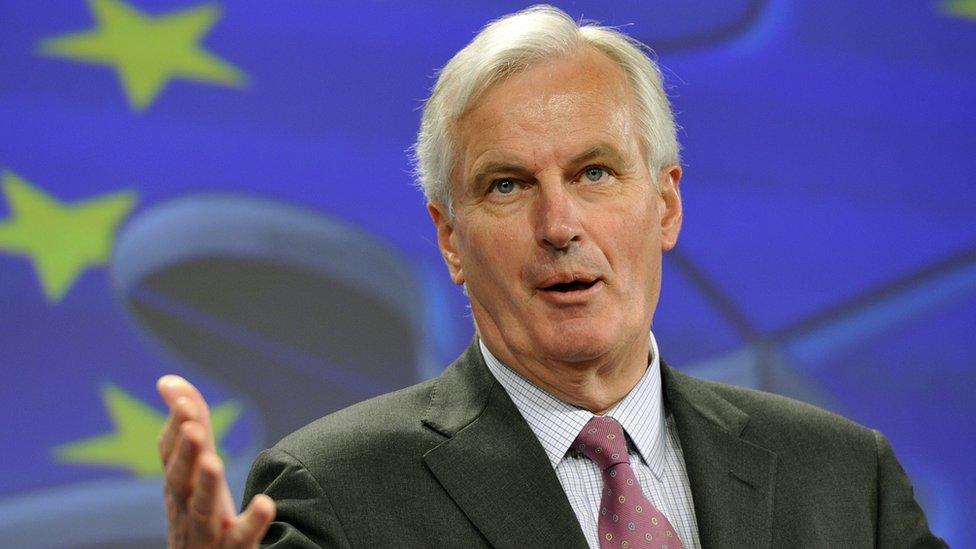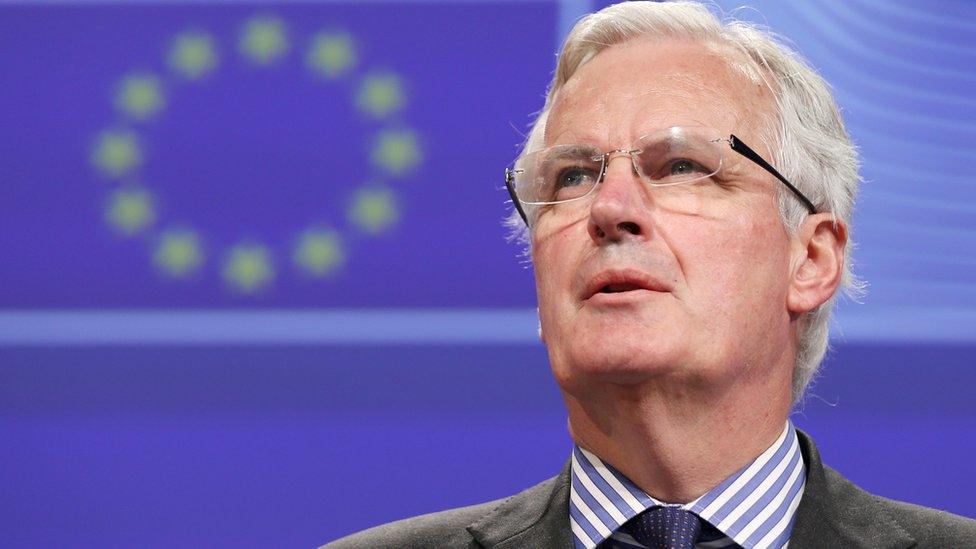Brexit: EU negotiator says 'time's short' for reaching deal
- Published
- comments
Michel Barnier warns the UK it cannot "cherry pick"
The UK will have to reach a Brexit deal by October 2018, according to the EU's chief negotiator for Brexit.
Michel Barnier told reporters that "time will be short" for negotiations because the proposed deal needed to be ratified as part of the two year process set to be triggered in March.
He said the UK could not "cherry pick" on issues such as the single market.
Earlier, UK Prime Minister Theresa May told the BBC she was aiming for a "red, white and blue Brexit" for the UK.
Speaking at a press conference in Brussels, Mr Barnier said a taskforce of 30 people had been set up to make sure the EU would "be ready" when Article 50 was called.
"Time will be short," he said. "It is clear the period for actual negotiations will be shorter than two years.
"At the beginning, the two years included the time for the council to set guidelines and to authorise negotiations. At the end, the agreement must of course be approved by the Council and European Parliament. Finally the UK will have to approve the agreement - all within the two year period.
"All in all there will be less than 18 months to negotiate. That is short. Should the UK notify by the end of March as Prime Minister Theresa May said she would, it is safe to say negotiations could start a few weeks later and an Article 50 deal reached by October 2018."
Mr Barnier, making his first public speech on the issue, was appointed to the post of chief Brexit negotiator on 1 October this year by European Commission President Jean-Claude Juncker, who said he "wanted an experienced politician for this difficult job".
The chief negotiator said he had spent time speaking to European member governments and said the Brexit negotiations had been informed by four main principles.
These included the "determination for unity" and a pledge to not start negotiations before being officially notified by the UK of its desire to leave, via the triggering of Article 50.
He also said: "Being a member of EU comes with rights and benefits. Third countries (non members as the UK will be after Brexit) can never have the same rights and benefits since they are not subject to the same obligations.
"The single market and its four freedoms (which includes freedom of movement) are indivisible. Cherry picking is not an option."
Theresa May interview: I'm ambitious for what we can achieve
The BBC's Europe correspondent Damian Grammaticas asked Mr Barnier if the UK "paying in" to stay in the single market was a possibility after Brexit Secretary David Davis said last week the government "would consider it".
"There is access to the single market, but this is accompanied by predetermined, very specific contribution to the EU budget," said the chief negotiator.
"That is one of the models that already exists and that is one of the closest models there is to the EU without being a member."
But Mr Barnier added there were various options and until Article 50 had been called, there was little more he could say.
"It is up to the UK to tell us what they have in mind, then it is up to us at the 27 [member states] to say what we are prepared to conceive of."
Mr Barnier said he "didn't like to speculate very much" on what the future relationship between the EU and the UK would be, but it was time to "keep calm and negotiate".
"The sooner, the better," he added. "We all have a common interest in not prolonging the lack of certainty and we for our part need to concentrate on the European agenda on this new page that we will be writing in the history in the construction of the EU.
"There will be rebalancing but my conviction remains the same. Europe has to be the bedrock on which European citizens can lean in order to push ahead and construct the EU further for their safety, security, defence and prosperity."
"It is much better to show solidarity than to stand alone."

Analysis - Damian Grammaticas, BBC Europe correspondent
Assessing EU negotiator Michel Barnier's message
The EU appears to be signalling loud and clear what is on offer to the UK - and what isn't.
This isn't the EU playing hardball. That's to misread the EU's cues. And it isn't new. EU leaders have reiterated the same principles ever since the UK referendum.
From their point of view, their position is logical and consistent. EU leaders believe they have built the world's most integrated single market. They don't want to unpick parts of it for one nation that is leaving. Preserving their union is their priority.
So, Michel Barnier made clear that the UK cannot expect better terms outside the EU than inside. UK talk of getting a special deal that privileges the car industry or the City of London may not to be acceptable to the EU. As for paying to get access to the Single Market, that's possible Mr Barnier hinted - if, like Norway, you accept the EU's rules.
But 'cherry-picking' won't happen, he said. Importantly too, he indicated, a Brexit deal will cover the exit terms.
The UK's future relationship with the EU will, in all likelihood, have to be settled later, once the UK is out of the EU and has the status of a third country. It's not about driving a hard bargain. The EU is signalling it has its rules and principles, and isn't offering to change them.

Downing Street said it was sticking to its timetable despite the speech from Mr Barnier.
The prime minister's official spokesman said: "In terms of how long the negotiations actually take place, clearly that is a matter that will resolve itself as a result of the negotiations."
He said that the position of the rest of the EU on the timetable was a "matter for them".
But on the 18-month timetable, he said: "It is the first I have heard of it."
Mrs May said getting the right deal for British people would benefit the EU.
Speaking to the BBC's deputy political editor John Pienaar - before Mr Barnier's comments - on her two-day trip to Bahrain, Theresa May said: "People talk about the sort of Brexit that there is going to be. Is it hard or soft? Is it grey or white?
"Actually we want a red, white and blue Brexit; that is the right Brexit for the UK, the right deal for the UK. I believe that a deal that is right for the UK will also be a deal that is right for the EU."
Case for transitional arrangements?
On the issue of revealing more of those plans to Parliament, the prime minister said she still wanted "to keep some cards close to my chest".
But Mrs May said regardless of the outcome of this week's Supreme Court case - on whether the government can trigger Article 50 alone or need parliamentary approval - she would "deliver on the vote of the British people."
Hilary Benn, chairman of the Brexit Select Committee and Labour MP, believes talk of an 18-month time limit will add extra pressure.
He told BBC News: "It means there is going to be a very short time from the triggering of Article 50 to negotiate the divorce arrangements and crucially what our new relationship with Europe is going to be once we have left, when it comes to trade and the single market.
"What I think he has said reinforces the argument that I have been making that we are going to need transitional arrangements [around the negotiations]."
Mr Barnier said a short term agreement "could have some point" in helping move towards a final deal.
But Boris Johnson said 18 months is "ample time" for the UK to negotiate with the EU.
Speaking as he arrived at a NATO meeting of foreign ministers in Brussels, the Foreign Secretary said: "With a fair wind and everybody acting in a positive and compromising mood, as I'm sure they will, we can get a great deal for the UK and for the rest of Europe".
What about Northern Ireland?
When in charge of regional policy, Mr Barnier said he worked on a programme supporting Northern Ireland and the Good Friday agreement.
When asked by The Irish Times whether he would dismiss the idea of a hard border being put in place post-Brexit, he would not commit either way.
"The UK decision to leave the EU will have consequences, in particular perhaps for what are the EU's external borders today," he said.
"All I can say at this moment in time is I am personally extremely aware of this particular topic. We will throughout these negotiations with the UK and of course with Ireland, do our utmost to uphold the success of the Good Friday Agreement and of course retain the dialogue there."
A former EU commissioner, Mr Barnier led the EU's banking reforms and was dubbed "the most dangerous man in Europe" by some in the financial services industry.
But after he championed capping bankers' bonuses, he won respect as a tough but even-handed negotiator.
Mr Barnier has refused to take part in any pre-negotiations before Article 50 is triggered, but he did meet Brexit Secretary David Davis for coffee last month.
Speaking in November in Brussels, he said: "Don't ask me to tell you what will be at the end of the road, we haven't begun to walk yet."
- Published27 July 2016

- Published3 October 2016
